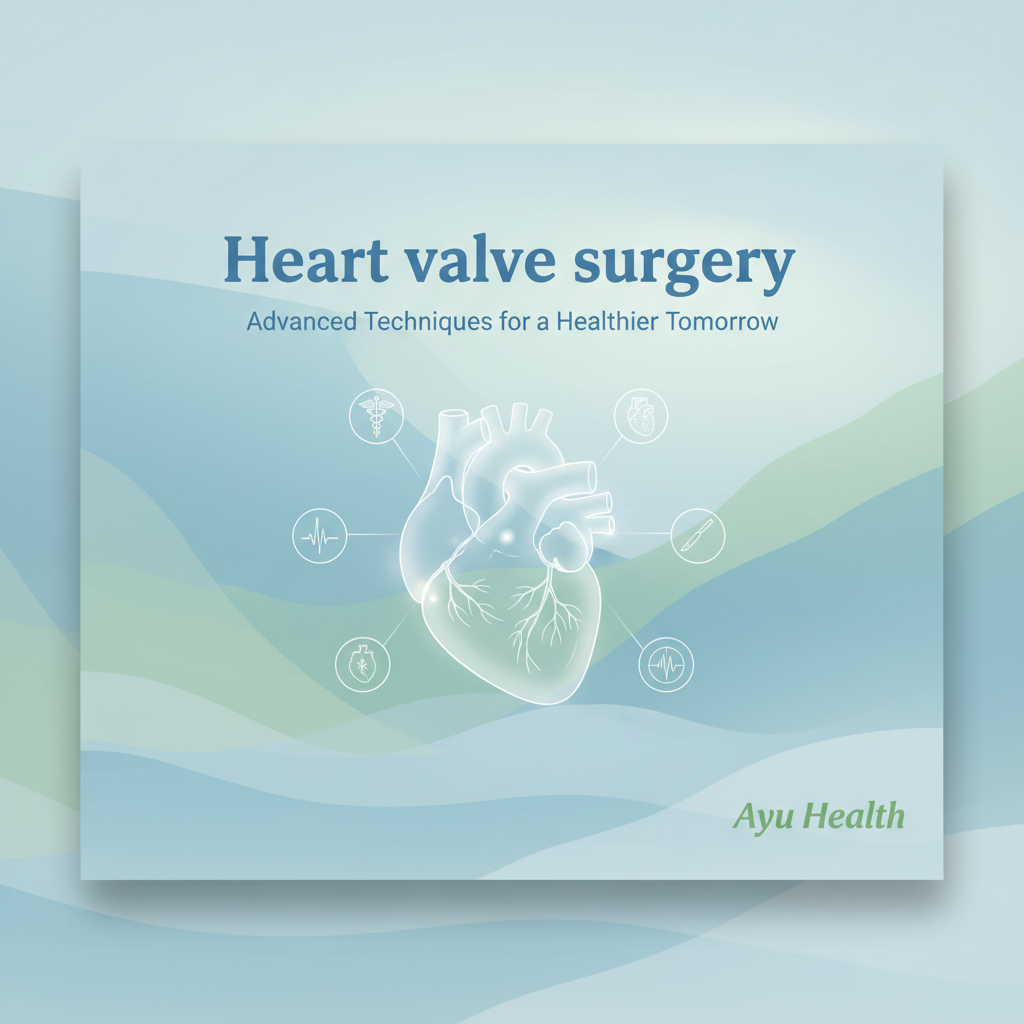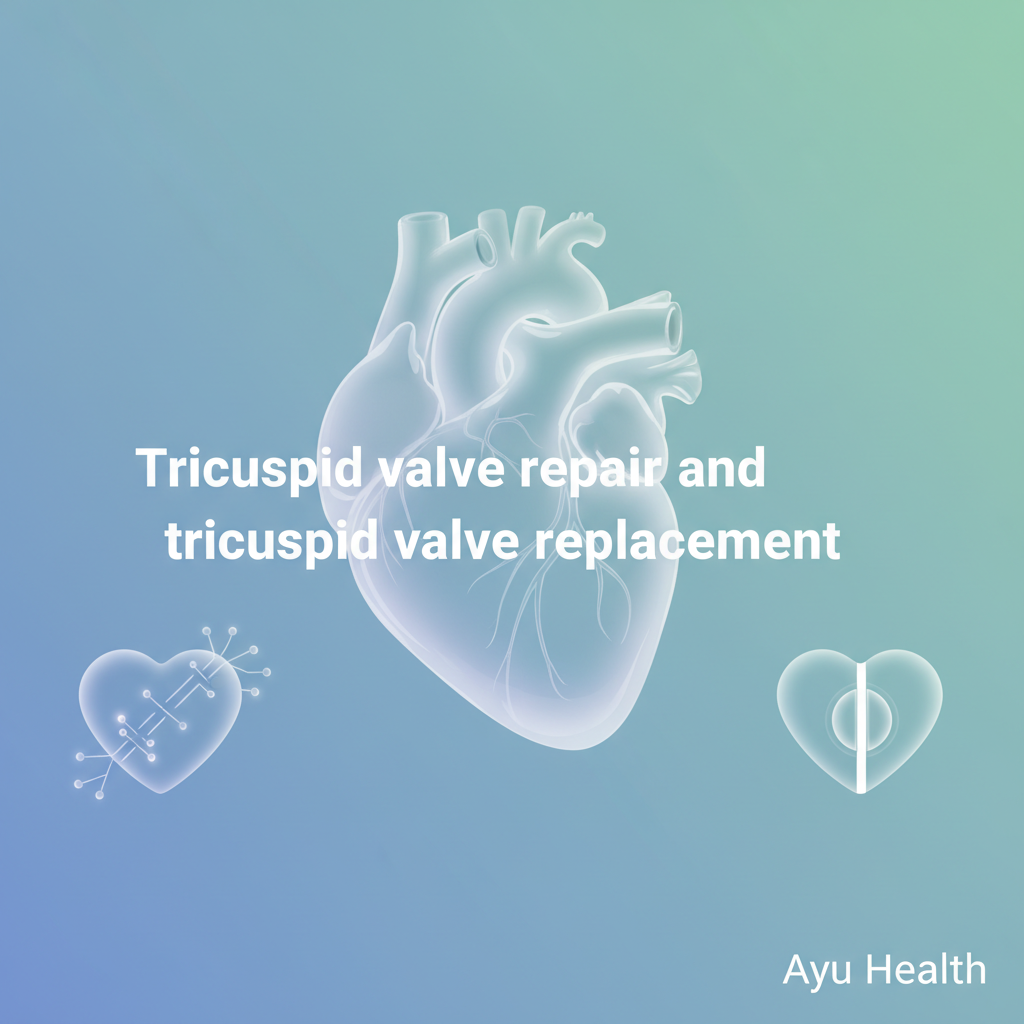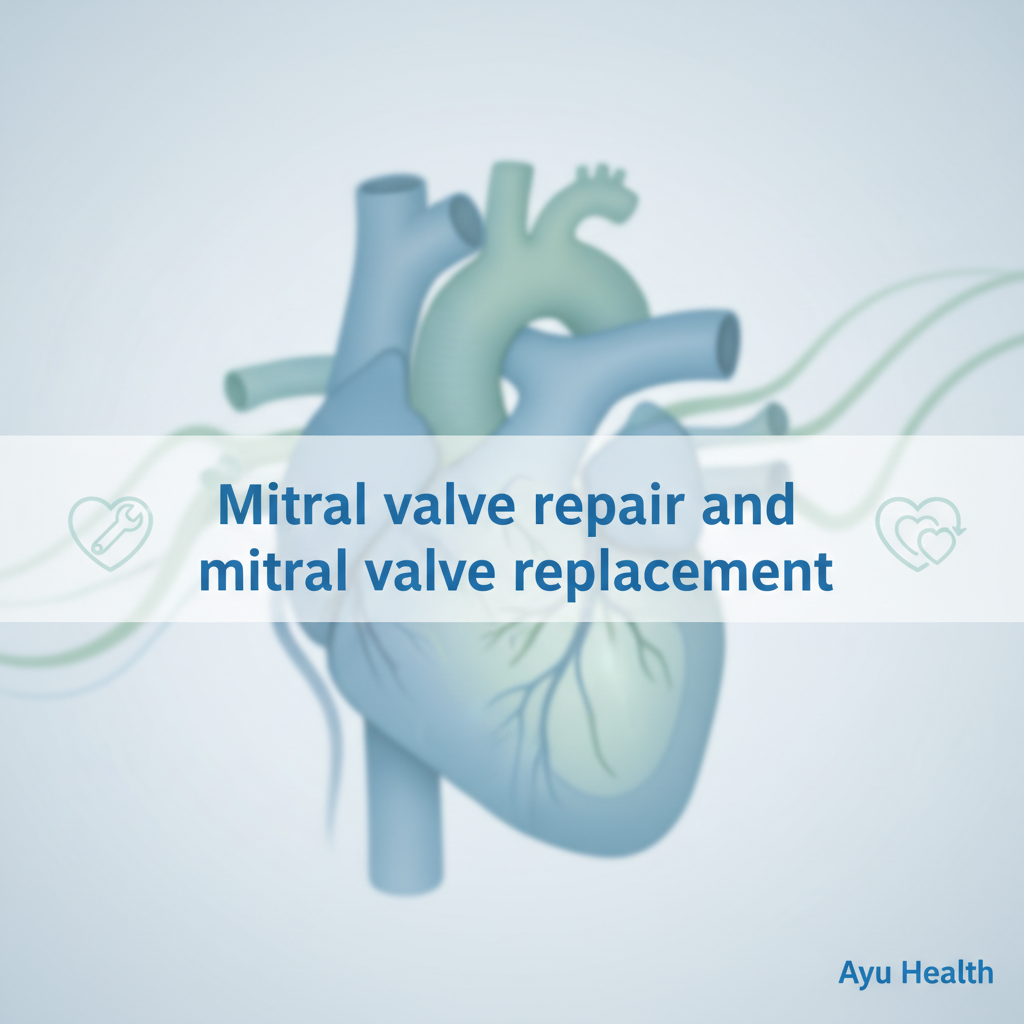What is Heart Valve Surgery?
Heart valve surgery is a critical medical intervention designed to repair or replace diseased or damaged heart valves. These valves – the aortic, mitral, tricuspid, and pulmonary – act as one-way doors, ensuring that blood flows efficiently through the heart and to the rest of the body. When a valve malfunctions, whether due to narrowing (stenosis) or leakage (regurgitation), the heart must work harder, potentially leading to heart failure, shortness of breath, and other serious complications.
This surgery aims to restore proper blood flow, alleviate symptoms, and improve the patient's overall quality of life. The choice between repair and replacement depends on the severity of the valve damage and the patient's overall health. With advancements in surgical techniques, including minimally invasive options, heart valve surgery has become increasingly safe and effective in India.
Key Facts:
- India is a leading destination for heart valve surgery due to its skilled surgeons and cost-effective treatment options.
- The success rate of heart valve surgery is high, with a reported five-year survival rate of around 94% after aortic valve replacement.
- Both valve repair and replacement options are available, with the choice depending on the specific condition and patient factors.
Why is Heart Valve Surgery Performed?
Heart valve surgery becomes necessary when one or more heart valves are not functioning correctly, impacting the heart's ability to pump blood efficiently. This can arise from various conditions, including:
- Congenital heart defects: Problems with the heart valves present at birth.
- Rheumatic heart disease: Damage to the heart valves caused by rheumatic fever, a complication of strep throat.
- Infective endocarditis: An infection of the heart valves.
- Age-related degeneration: Gradual wear and tear on the heart valves over time.
- Calcification: Calcium deposits on the valves, causing them to stiffen and narrow.
Doctors typically recommend heart valve surgery when:
- The patient experiences significant symptoms such as shortness of breath, chest pain, fatigue, or swelling in the ankles and feet.
- Diagnostic tests, such as an echocardiogram, reveal severe valve stenosis or regurgitation.
- Medications and lifestyle changes are no longer effectively managing the patient's symptoms.
- The patient is at risk of developing heart failure or other serious complications due to the valve dysfunction.
- The patient's quality of life is significantly impacted by the valve condition.
Preparation for Heart Valve Surgery
Proper preparation is crucial for a successful heart valve surgery and a smooth recovery. Here’s what you can expect:
Essential Preparation Steps:
- Diagnostic Tests: Undergo all required tests, including blood tests, ECG (electrocardiogram), echocardiogram, and angiography, as prescribed by your doctor.
- Medical Evaluation: Attend appointments with your cardiologist, surgeon, and other specialists to assess your overall health and discuss the surgical plan.
- Medication Review: Inform your doctor about all medications, including over-the-counter drugs and supplements. They will advise which medications to continue and which to stop before surgery.
- Lifestyle Modifications:
- Quit Smoking: If you smoke, stop smoking as soon as possible.
- Healthy Diet: Follow a balanced diet rich in fruits, vegetables, and lean protein.
- Moderate Exercise: Engage in light exercise as recommended by your doctor.
- Pre-operative Instructions: Follow all pre-operative instructions provided by the hospital, including fasting guidelines.
India-Specific Tips:
- Fasting: Typically, you will be asked to abstain from food and drink for 8-12 hours before the surgery. Confirm the specific fasting instructions with your hospital.
- Documents: Ensure you have all necessary documents, including your Aadhaar card, insurance card, medical records, and any referral letters.
- PCPNDT Act (If applicable): If you are a woman of childbearing age, be prepared for questions related to the Pre-Conception and Pre-Natal Diagnostic Techniques (PCPNDT) Act, as hospitals are legally obligated to comply with this law.
- Arrange for Support: Enlist the help of family or friends for post-operative care and transportation.
- Plan for Accommodation: If you are traveling from another city, arrange for accommodation near the hospital for your family.
- Hygiene: Maintain good personal hygiene to minimize the risk of infection.
What to Expect:
- Pre-Admission: You will likely be admitted to the hospital a day or two before the surgery for pre-operative assessments and preparations.
- Consultations: Meet with the surgical team, including the surgeon, anesthesiologist, and nurses, to discuss the procedure and address any concerns.
- Pre-operative Instructions: Receive detailed instructions about what to expect before, during, and after the surgery.
- Anesthesia: You will be given general anesthesia, so you will be asleep during the procedure.
The Heart Valve Surgery Procedure
The heart valve surgery procedure can be performed using various techniques, depending on the patient's condition and the surgeon's expertise. Here's a general overview:
Step-by-Step (Concise):
- Anesthesia: General anesthesia is administered, and the patient is connected to a heart-lung machine, which takes over the function of the heart and lungs during the surgery.
- Surgical Approach:
- Open-Heart Surgery: A large incision is made in the chest to access the heart.
- Minimally Invasive Surgery: Smaller incisions are made, and specialized instruments are used to access the heart. This may involve robotic assistance.
- Transcatheter Valve Replacement (TAVR): A catheter (thin tube) is inserted through a blood vessel (usually in the groin or chest) and guided to the heart.
- Valve Repair or Replacement:
- Valve Repair: The surgeon repairs the damaged valve by techniques such as annuloplasty (tightening the valve ring), leaflet repair, or chordal repair.
- Valve Replacement: The damaged valve is removed and replaced with a mechanical or biological valve.
- Closure: The heart is restarted, and the chest incision is closed.
- Post-Surgery Monitoring: The patient is transferred to the intensive care unit (ICU) for close monitoring.
Duration, Comfort Level:
- The surgery typically lasts 3-6 hours, depending on the complexity of the procedure.
- You will be under general anesthesia, so you will not feel any pain during the surgery.
- After the surgery, you may experience some discomfort or pain, which can be managed with pain medication.
What Happens During the Test:
- Pre-operative preparations: IV lines will be inserted, and you will be connected to monitoring equipment.
- Anesthesia induction: You will be given medication to induce general anesthesia, causing you to fall asleep.
- Surgical procedure: The surgeon will perform the necessary repairs or replacement of the heart valve.
- Post-operative care: After the surgery, you will be closely monitored in the ICU.
Understanding Results
Heart valve surgery aims to improve heart function and overall health. Understanding the results is vital for managing your health after surgery.
Normal vs. Abnormal Ranges (if applicable):
While there aren't specific "normal" ranges applicable immediately post-surgery, doctors monitor several indicators to assess the surgery's success and your recovery. These include:
- Echocardiogram: This ultrasound of the heart shows how well the new or repaired valve is functioning. Doctors look for minimal leakage (regurgitation) and proper opening of the valve. Follow-up echocardiograms are crucial to monitor valve function over time.
- Blood Pressure: Maintaining a healthy blood pressure range is important for overall cardiovascular health and to reduce strain on the heart. Your doctor will advise on target blood pressure levels.
- Heart Rhythm: Monitoring for any irregular heart rhythms (arrhythmias) is essential, especially in the initial recovery period.
- Blood Tests: These tests monitor your overall health, including kidney function, liver function, and blood clotting. If you're on blood thinners (anticoagulants) due to a mechanical valve, regular blood tests (INR monitoring) are crucial to ensure the medication is at the correct level.
- Exercise Tolerance: As you recover, your ability to perform physical activities will be assessed. An increase in exercise tolerance indicates improved heart function.
What Results Mean:
- Improved Heart Function: Successful surgery results in improved blood flow through the heart, reducing strain and improving overall heart function.
- Symptom Relief: Patients often experience significant relief from symptoms like shortness of breath, fatigue, and chest pain.
- Reduced Risk of Complications: The surgery reduces the risk of heart failure, stroke, and other complications associated with valve disease.
Next Steps:
- Follow-up Appointments: Regular follow-up appointments with your cardiologist are crucial to monitor valve function, adjust medications, and address any concerns.
- Medication Management: Adhere to your medication regimen, including blood thinners (if prescribed), and understand the importance of consistent adherence.
- Lifestyle Modifications: Continue to follow a heart-healthy lifestyle, including a balanced diet, regular exercise, and smoking cessation.
- Cardiac Rehabilitation: Consider participating in a cardiac rehabilitation program to improve your physical fitness and overall well-being.
- Infection Prevention: Take precautions to prevent infections, as infections can damage heart valves. This includes practicing good hygiene and seeking prompt treatment for any infections.
Costs in India
The cost of heart valve surgery in India is a significant consideration for patients and their families. Here's a breakdown of the factors influencing the cost and approximate price ranges:
Price Range in ₹:
- Heart Valve Repair Surgery: ₹2,40,000 to ₹4,75,000
- Heart Valve Replacement Surgery: ₹1,50,000 to ₹12,50,000 (This is a broad range. The actual cost depends on various factors.)
- Mechanical Valve Replacement: ₹3,00,000 to ₹7,00,000 or more
- Biological Valve Replacement: ₹2,00,000 to ₹5,00,000 or more
Tier-1 vs. Tier-2 Cities:
Generally, costs tend to be higher in Tier-1 cities (e.g., Mumbai, Delhi, Chennai, Bangalore) compared to Tier-2 cities (e.g., Pune, Ahmedabad, Kolkata, Hyderabad). The difference can be attributed to factors like higher hospital overheads, surgeon fees, and cost of living in Tier-1 cities. Expect to pay 10-20% more in Tier-1 cities for the same procedure.
Government vs. Private Hospitals:
- Government Hospitals: Offer significantly lower costs, but may have longer waiting lists and potentially less personalized care.
- Private Hospitals: Provide more advanced facilities, shorter waiting times, and often a wider range of options, but at a higher cost.
Insurance Tips:
- Check Coverage: Thoroughly review your health insurance policy to understand the coverage for heart valve surgery. Pay attention to any exclusions, waiting periods, or sub-limits.
- Pre-Authorization: Obtain pre-authorization from your insurance company before the surgery to ensure coverage and avoid unexpected expenses.
- Cashless Facility: Choose a hospital that offers a cashless facility with your insurance provider to simplify the payment process.
- Compare Policies: If you are considering purchasing a new health insurance policy, compare different policies to find the one that offers the best coverage for heart valve surgery.
- Government Schemes: Explore government-sponsored health insurance schemes like Ayushman Bharat Pradhan Mantri Jan Arogya Yojana (AB-PMJAY), which may provide financial assistance for eligible patients.
How Ayu Helps
Ayu is designed to simplify your healthcare journey. You can:
- Store results digitally: Securely store your echocardiogram reports, blood test results, and other medical documents related to your heart valve surgery.
- Track over time, share via QR: Monitor your progress by tracking your results over time and easily share your medical history with doctors or family members using a QR code.
FAQ
Q1: What is the difference between a mechanical and a biological heart valve?
A: Mechanical valves are made from durable materials and last longer but require lifelong blood thinners. Biological valves are made from animal or human tissue, don't usually require lifelong blood thinners, but may not last as long.
Q2: How long is the recovery period after heart valve surgery?
A: The initial recovery period in the hospital is typically 5-10 days. Full recovery can take several weeks to months, depending on the individual and the type of surgery.
Q3: Will I need to take medication after heart valve surgery?
A: Yes, most patients require medication after heart valve surgery. If you receive a mechanical valve, you will need to take lifelong blood thinners. Other medications may include blood pressure medications, diuretics, and pain relievers.
Q4: Can I lead a normal life after heart valve surgery?
A: Yes, most patients can lead a normal and active life after heart valve surgery. However, you may need to make some lifestyle changes, such as following a heart-healthy diet, exercising regularly, and avoiding smoking.
Q5: What are the risks of heart valve surgery?
A: As with any surgery, heart valve surgery carries some risks, including bleeding, blood clots, infection, pneumonia, breathing problems, and valve dysfunction. Your surgeon will discuss these risks with you before the surgery.
Q6: How do I choose the right hospital and surgeon for heart valve surgery in India?
A: Research hospitals with experienced cardiac surgeons and advanced facilities. Look for hospitals with international accreditation and positive patient reviews. Consult with multiple surgeons to discuss your options and choose the one you feel most comfortable with.
Q7: Is minimally invasive heart valve surgery better than open-heart surgery?
A: Minimally invasive surgery may offer a faster recovery and smaller scars, but it is not suitable for all patients. The best approach depends on your individual condition and the surgeon's expertise.
Q8: What are the warning signs of valve dysfunction after surgery?
A: Warning signs of valve dysfunction include shortness of breath, chest pain, fatigue, swelling in the ankles and feet, and dizziness. If you experience any of these symptoms, contact your doctor immediately.



